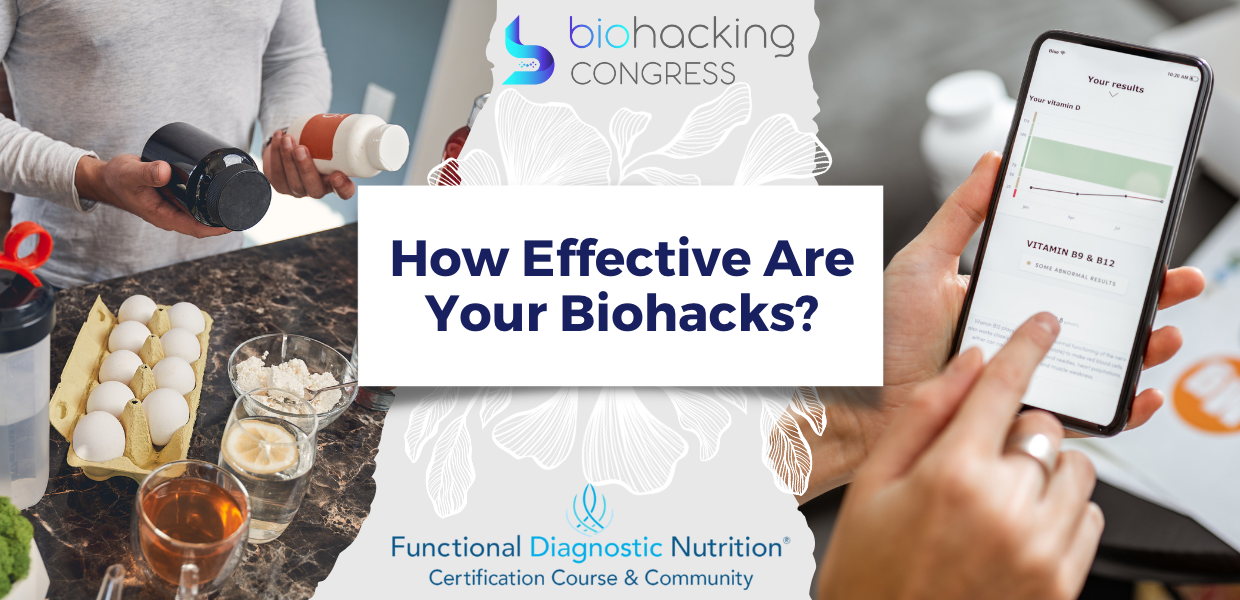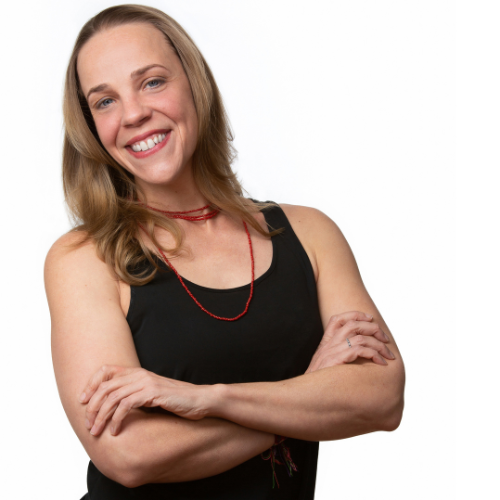How Effective Are Your Biohacks?
Elizabeth Gaines, a Functional Health Expert and course supervisor at Functional Diagnostic Nutrition (FDN), delivered an enlightening lecture at the Biohacking Congress. In her talk, she emphasized the importance of having a framework and methodology for contextualizing data in order to optimize health outcomes. By considering data as a whole rather than isolated points, people can make more informed decisions about interventions and methodologies. This article explores the key highlights from Elizabeth Gaines' lecture and the significance of adopting a comprehensive approach to biohacking.
Elizabeth Gaines acknowledged the audience's enthusiasm for biohacking and their commitment to understanding their health. She highlighted that good health extends beyond the absence of symptoms and encompasses abundant vitality, life force energy, joy, contentment, and existential purpose. With this understanding, Gaines commended the audience for seeking to elevate their well-being and improve their overall quality of life.
As an FDN practitioner herself, Elizabeth Gaines shed light on the methodology developed by Reed Davis, the founder of Functional Diagnostic Nutrition. Davis drew from 20 years of clinical experience and extensive lab testing on thousands of people to create a comprehensive framework. This framework provides a step-by-step method for working with clients or oneself, eliminating guesswork and enabling more accurate predictions about what interventions will be effective.

The Functional Diagnostic Nutrition Approach: Bridging the Gap From Illness to Optimal Health
Achieving good health is a universal goal, but for some, it goes beyond mere recovery to reach a state of optimal performance or what is commonly referred to as "superhuman" health. FDN Practitioners excel at helping people transition from illness to a state of normalcy, even in the face of significant metabolic challenges. However, the journey from being "normal" to attaining optimal health can be just as daunting. Biohackers, who seek to optimize their physical and mental capabilities, are constantly exploring a wide range of therapies, treatments, supplements, and devices. Yet, despite their efforts, many struggle to find the ultimate biohack that will provide the competitive edge they desire. While progress is being made in measuring and understanding health metrics, the complete picture often eludes even the most dedicated biohackers. Although being symptom-free may suggest good health, it does not necessarily equate to optimal well-being. There exists a significant gap between being in a normal state of health and achieving superhuman capabilities. While FDN Practitioners work diligently to bring people back to a baseline of normalcy, the pursuit of optimal health requires an entirely different set of tools and strategies.
Biohackers are passionate people who aspire to elevate their physical and cognitive performance beyond the realms of ordinary capabilities. They invest considerable time and financial resources in a myriad of therapies, supplements, smart devices, and gadgets, hoping to discover the one biohack that will provide them with a distinct advantage. However, this quest often leads them into a cycle of trial and error, as they attempt to identify the elusive solution that can bridge the gap between normal and optimal health.
While biohackers are adept at measuring and quantifying various health metrics, they frequently find themselves lacking a comprehensive understanding of the entire picture. Despite the progress made in tracking and analyzing data, the complexity of human biology and the interplay of numerous factors can make it difficult to achieve a holistic view of health. As a result, biohackers may experience a sense of frustration, unable to grasp the full scope of their well-being.

The gap between normal and optimal health can be as vast as the one between sickness and normalcy. Biohackers invest significant resources in exploring various strategies, yet often find themselves caught in a cycle of trial and error. Although progress has been made in measuring health metrics, the complex nature of human biology means that the complete picture may remain elusive. Bridging the gap between normal and optimal health requires a multifaceted approach, with continued research and innovation paving the way for a better understanding of human performance.
Effectiveness of Biohacks: Test, Don't Guess
Biohacking has gained popularity as individuals seek to optimize their health and well-being. However, amidst the multitude of biohacks available, it is crucial to assess their effectiveness. The key lies in testing and collecting data to tailor personalized protocols. The foundation of successful biohacking lies in testing rather than relying on guesswork. By conducting tests, people gather evidence and data necessary to guide their unique biohacking protocols. The power of testing lies in providing tangible information that can be used to make informed decisions about one's health.
Biohacking is not a one-size-fits-all solution. What works for one person may not have the same impact on another. When trying a biohack, there are three possible outcomes: improvement, no noticeable change, or even a worsening of symptoms. This variability is due to the highly individualized nature of metabolic chaos, highlighting the importance of personalized approaches in biohacking.
Data is highly valued by biohackers, who recognize its significance in optimizing their well-being. However, it is essential to distinguish between having more data and having the right data. Simply accumulating vast amounts of information may not be as valuable as obtaining the specific data points that are relevant to people's health goals. Just like selecting a few relevant books from a vast library for a research paper, focusing on the right information is crucial.
The human body is a complex system with countless data points to measure. However, without understanding how these data points connect to one another, their true value remains unclear. It is crucial to explore the interconnectedness of different aspects of health and identify meaningful correlations. By doing so, biohackers can make more accurate assessments and derive insights that lead to effective interventions.

Personalized Biohacking:
In a lecture by Elizabeth Gaines, a Functional health expert and FDN-P, she discusses the two types of biohackers and emphasizes the importance of considering people’s needs and unique metabolic chaos when it comes to achieving optimal results. While certain biohacks may have a solid scientific foundation for the general population, the science of the individual must be taken into account for personalized success.

Each person possesses a unique biological makeup, with their own set of metabolic challenges and requirements. Biohackers who understand the science of the individual recognize that a one-size-fits-all approach may not yield the desired results. While a biohacker may confidently explain the science behind their chosen biohack, it does not guarantee its effectiveness for a particular problem or individual. To harness the full potential of biohacking, it is essential to measure the effectiveness of chosen strategies and identify areas for improvement. Examining hormone levels, circadian rhythm, and energy production, including mitochondrial function, offers valuable insights into an individual's physiological status. These objective baseline measurements enable biohackers to gauge the impact of their interventions accurately. By focusing on data-driven outcomes rather than symptom chasing, individuals can optimize their biohacking efforts and achieve meaningful results.
The Cycle of Trial and Error:
Many biohackers adopt a trial-and-error mindset, willing to try various products, modalities, or devices without concrete evidence of their efficacy. While this approach may lead to occasional success, it can also result in a considerable amount of hit-or-miss experiences. This "well, I'll give it a try" mentality can be lucrative for those selling biohacking products but may not provide consistent and targeted results for individuals.
To bridge the gap between science and individuality in biohacking, Elizabeth Gaines suggests the utilization of more personalized, data-based systems. By gathering and analyzing individual data such as biomarkers, genetics, lifestyle factors, and specific health goals, biohackers can create customized strategies that align with their unique metabolic needs. This approach allows for a more targeted and effective biohacking experience, minimizing the reliance on guesswork and increasing the chances of achieving optimal results.
In the world of biohacking, understanding the science behind a particular biohack is crucial, but it is equally important to consider the science of the individual. Embracing personalized, data-based systems allows biohackers to tailor their strategies to individual needs, resulting in a more effective and targeted approach. By moving away from the trial-and-error cycle and focusing on individualized data, biohackers can bridge the gap between scientific knowledge and personalized optimization, ultimately unlocking their full potential.
BiohackingCongress Team is very grateful to Elizabeth Gaines, FDN-P, Functional health expert, for joining the BiohackingCongress and giving a life-changing lecture.
Watch Elizabeth Gaines’s lecture and 100+ lectures, panel discussions, and performances from renowned biohackers on biohacking your body with a BiohackingCongress year-long subscription. Get your access to a healthy future now!
Subscribe to watch more Videos with Top Biohackers. Stay tuned into the latest biohacking products for biohacking your health and biohacking for longevity.
Based on the lecture by Elizabeth Gaines
Join BiohackingCongress Miami on October 20-22!
Additionally, if you're interested in learning more about optimizing your body's potential and maintaining good health, we invite you to attend the BiohackingCongress in Miami on October 20-22! Limited early bird tickets are available, so don't wait to reserve your spot. Click the button below to purchase your tickets now:
Join us for an exceptional experience at the BiohackingCongress Miami, featuring a panel of leading biohacking and longevity experts who will showcase the latest research and insights on how to optimize your life.
Get ready to be inspired by our remarkable speakers and seize the chance to connect with like-minded individuals. Don't miss out on this incredible opportunity to take your personal growth to the next level!
Special Access to
Exclusive TopBiohacks
and more



